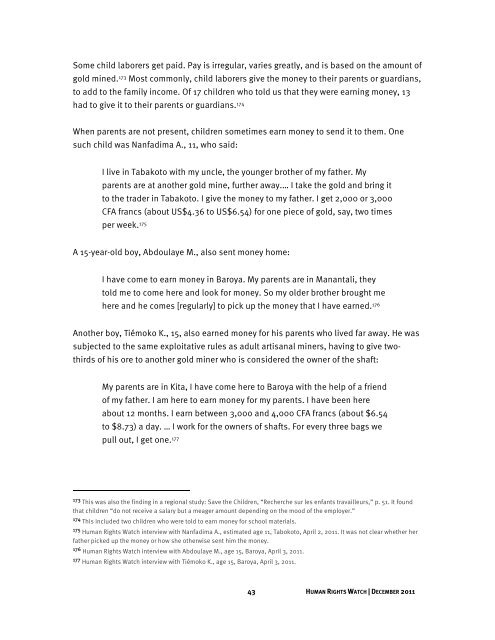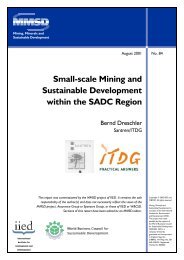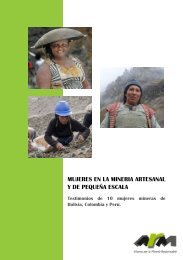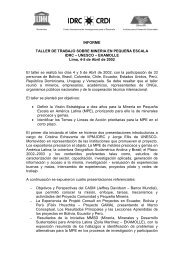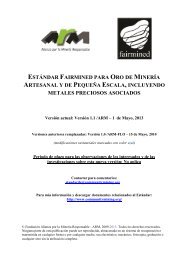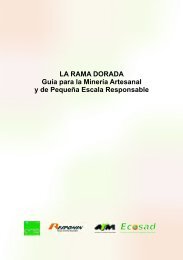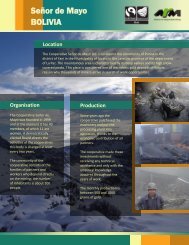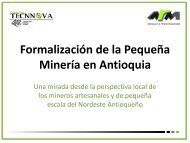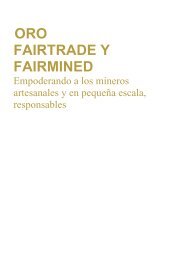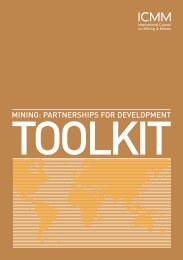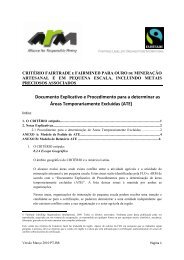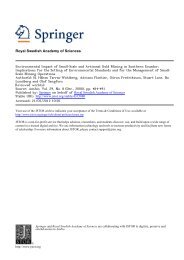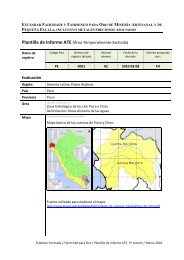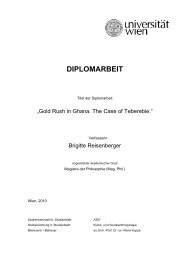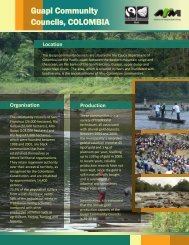A Poisonous Mix - Human Rights Watch
A Poisonous Mix - Human Rights Watch
A Poisonous Mix - Human Rights Watch
Create successful ePaper yourself
Turn your PDF publications into a flip-book with our unique Google optimized e-Paper software.
Some child laborers get paid. Pay is irregular, varies greatly, and is based on the amount of<br />
gold mined. 173 Most commonly, child laborers give the money to their parents or guardians,<br />
to add to the family income. Of 17 children who told us that they were earning money, 13<br />
had to give it to their parents or guardians. 174<br />
When parents are not present, children sometimes earn money to send it to them. One<br />
such child was Nanfadima A., 11, who said:<br />
I live in Tabakoto with my uncle, the younger brother of my father. My<br />
parents are at another gold mine, further away.… I take the gold and bring it<br />
to the trader in Tabakoto. I give the money to my father. I get 2,000 or 3,000<br />
CFA francs (about US$4.36 to US$6.54) for one piece of gold, say, two times<br />
per week. 175<br />
A 15-year-old boy, Abdoulaye M., also sent money home:<br />
I have come to earn money in Baroya. My parents are in Manantali, they<br />
told me to come here and look for money. So my older brother brought me<br />
here and he comes [regularly] to pick up the money that I have earned. 176<br />
Another boy, Tiémoko K., 15, also earned money for his parents who lived far away. He was<br />
subjected to the same exploitative rules as adult artisanal miners, having to give twothirds<br />
of his ore to another gold miner who is considered the owner of the shaft:<br />
My parents are in Kita, I have come here to Baroya with the help of a friend<br />
of my father. I am here to earn money for my parents. I have been here<br />
about 12 months. I earn between 3,000 and 4,000 CFA francs (about $6.54<br />
to $8.73) a day. … I work for the owners of shafts. For every three bags we<br />
pull out, I get one. 177<br />
173 This was also the finding in a regional study: Save the Children, “Recherche sur les enfants travailleurs,” p. 51. It found<br />
that children “do not receive a salary but a meager amount depending on the mood of the employer.”<br />
174 This included two children who were told to earn money for school materials.<br />
175 <strong>Human</strong> <strong>Rights</strong> <strong>Watch</strong> interview with Nanfadima A., estimated age 11, Tabokoto, April 2, 2011. It was not clear whether her<br />
father picked up the money or how she otherwise sent him the money.<br />
176 <strong>Human</strong> <strong>Rights</strong> <strong>Watch</strong> interview with Abdoulaye M., age 15, Baroya, April 3, 2011.<br />
177 <strong>Human</strong> <strong>Rights</strong> <strong>Watch</strong> interview with Tiémoko K., age 15, Baroya, April 3, 2011.<br />
43 HUMAN RIGHTS WATCH | DECEMBER 2011


